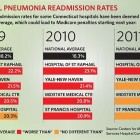Disparities
Connecticut Lags In Kids’ Mental Health Screening; Reforms Considered
|
Selenia Velez remembers the near-daily phone calls from the pre-school, alerting her that her 2-year-old son had acted out aggressively and needed to be picked up immediately. The calls went on for months, as Velez, 27, of Hartford, and her husband bounced between the pre-school and their son’s pediatrician, who recommended that they take him to a psychiatrist for an evaluation. But the psychiatrist was booked and held them at bay, as Velez watched her son’s behavior deteriorate. “We just felt hopeless,” the mother of four recalls of her oldest son, now 7. “It was one of the most heartbreaking things you can go through as a mother.


